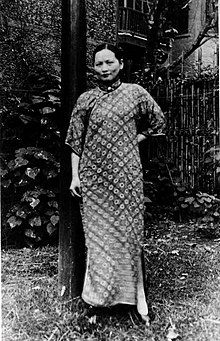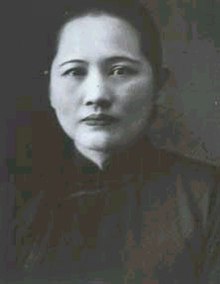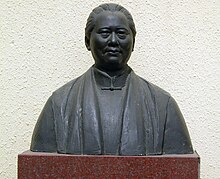Song Qingling

Song Qingling ( Chinese 宋慶齡 / 宋庆龄, Pinyin Sòng Qìnglíng , W.-G. Sung Ch'ing-ling , Jyutping Sung 3 Hing 3 ling 4 , born January 27, 1893 in Kunshan , Jiangsu Province , Chinese Empire , † May 29 1981 in Beijing , China ) was one of the three Song sisters whose husbands were among the most important politicians in China in the 20th century . AsMadame Sun Yat-sen , she is described as "the one who loved China". Her baptismal name was Rosamond. Her husband, Sun Yat-sen , was the first President of the Republic of China in 1912 . In post-war China she was deputy chairman in various offices from 1949 until her death and, after Liu Shaoqi's expulsion from the party, she was executive chairwoman of the People's Republic of China from 1968 to 1972 together with Dong Biwu . After Zhu Des's death , she was once again head of state from 1976 to 1978, as chairman of the Standing Committee of the National People's Congress . In 1981 she was the only person to be declared honorary president.
Life
(1912-1960)










Song Qingling was born to the wealthy businessman and missionary Charlie Soong , attended high school in Shanghai and graduated from Wesleyan College in Macon , Georgia , USA .
After his divorce from Lu Muzhen , she married Sun Yat-sen on October 25, 1915 in Japan . Qingling's parents were strongly opposed to this marriage because Dr. Sun was 26 years older than she was. After Sun's death in 1925, she was elected to the Central Executive Committee of the Kuomintang in 1926, but after the Communists were expelled from the KMT in 1927, she went into exile in Moscow .
Although she was reconciled with the Kuomintang during the Second Sino-Japanese War (1937-1945), she sided with the communists in the Chinese Civil War . However, she did not join the party, but belonged to the United Front , which was above the Revolutionary Committee of the Kuomintang .
In 1939 she founded the China Welfare Institute (originally English China Defense League ) in Hong Kong .
In 1949 she built the magazine China heute (originally English China Reconstructs , for example “China under construction”) with the support of Israel Epstein . This magazine is published monthly in six languages (Chinese, English, French, German, Arabic and Spanish).
After the founding of the People's Republic of China in 1949, she became Vice President of the People's Republic of China, Chairwoman of the Society for Sino-Soviet Friendship, and Honorary President of the All-China Women's Federation . In 1951 she received the Stalin Peace Prize , and in 1953 a collection of her works was published under the title Struggle for New China . From 1968 to 1972 she was acting head of state together with Dong Biwu .
On May 16, 1981, two weeks before her death, she was accepted into the Chinese Communist Party and made Honorary President of the People's Republic of China.
Unlike her younger sister, Song Meiling , who fled to Taiwan with her husband, Chiang Kai-shek , Song Qingling is highly revered in mainland China .
Vice-Presidency
From April 1959, Song again served as a deputy for Shanghai in the second National People's Congress. At this congress, Mao Zedong and Zhu De resigned from the presidency and vice presidency of the People's Republic of China. Liu Shaoqi was elected President of the People's Republic of China, and Song Qingling and Dong Biwu, a party elder, were elected vice presidents. At that time, Song resigned from her positions as vice-chairman of the Chinese People's Political Consultative Conference and the National People's Congress . In the early 1960s, Song performed occasionally at celebratory occasions to receive important overseas visits.
During the Cultural Revolution from 1966 to 1976, Song was criticized by the Red Guard faction and, in one incident, his parents' graves were desecrated and their bodies exposed. According to Song's biographers, Premier Zhou Enlai recommended that Song Qingling be placed on a cadre list with protection as a result of this incident.
Towards the end of the Cultural Revolution, during the fourth National People's Congress, the position of vice president was abolished, which for Song Qingling also marked the end of her presidency.
See also
literature
- Sterling Seagrave: Soong Dynasty . Sidg. & J, 1985, ISBN 978-0-283-99238-4
- Thomas Weyrauch : China's neglected republic. 100 years in the shadow of world history . Volume 1: 1911-1949 . Longtai, Giessen (ie) Heuchelheim 2009, ISBN 978-3-938946-14-5 .
Web links
- Literature by and about Song Qingling in the catalog of the German National Library
- Official website of the residence - Shanghai. In: shsoong-chingling.com (chinese)
- Former residence of Song Qingling - Beijing. In: china.org.cn (English)
- Clarissa Sebag Montefiore: Soong Qingling: 'The mother of modern China'. In: www.bbc.com, BBC Culture , December 23, 2015. (English)
- China Welfare Institute. In: cwi.org.cn. Archived from the original on February 4, 2012 .
- Soong Ching Ling Foundation Beijing, China. In: wuta.com. Archived from the original on February 4, 2012 (English, Soong Ching Ling Foundation).
Individual evidence
- ↑ China's honorary president dead , in Pforzheimer Zeitung of May 30, 1981, p. 1
- ↑ Sijia Chen, The Beijing Bucket List: Former Residence of Song Qingling , Beijing Kids, May 2, 2016 Retrieved on August 27, 2017
| personal data | |
|---|---|
| SURNAME | Song, Qingling |
| ALTERNATIVE NAMES | Madame Sun Yat-sen (pseudonym); Sòng, Qìnglíng (Pinyin); Sung, Ching-ling (Wade-Giles); Soong, Ching Ling (ad hoc romanization); Soong, Qingling (ad hoc romanization); Sung3, Hing3ling4 (Jyutping); 宋慶齡 (Chinese, traditional character); 宋庆龄 (Chinese, abbreviation) |
| BRIEF DESCRIPTION | Chinese politician |
| DATE OF BIRTH | January 27, 1893 |
| PLACE OF BIRTH | Kunshan , Jiangsu , China |
| DATE OF DEATH | May 29, 1981 |
| PLACE OF DEATH | Beijing , China |







